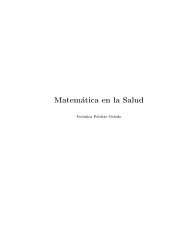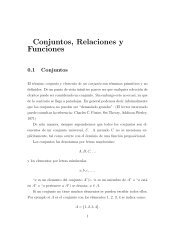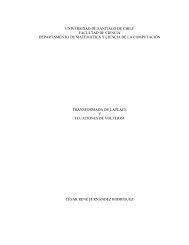Apuntes de Variable Compleja - Carlos Lizama homepage ...
Apuntes de Variable Compleja - Carlos Lizama homepage ...
Apuntes de Variable Compleja - Carlos Lizama homepage ...
Create successful ePaper yourself
Turn your PDF publications into a flip-book with our unique Google optimized e-Paper software.
4.4. TEOREMAS FUNDAMENTALES 29<br />
por teorema anterior. Sea h(z) := e g1(z) . Entonces<br />
así<br />
luego<br />
y<br />
h ′ = e g1<br />
′<br />
′ f g1 g 1 = e<br />
f<br />
h ′ f − hf ′ = 0<br />
( h<br />
f )′ = 0<br />
h<br />
f<br />
= c<br />
con c = cte<br />
Por lo tanto h(z) = cf(z) , c = 0 pues h = 0<br />
Asi tendremos<br />
f(z) = 1<br />
c eg1 = e g1(z)+c1<br />
Por lo tanto<br />
g(z) = g1(z) + c1<br />
entonces<br />
e g(z) = f(z)<br />
Ejemplo 54 1) Sea Ω:=C\{semieje real negativo}. Sea f(z) = z 2 . Entonces f(z)<br />
es holomorfa y sin ceros en Ω simplemente conexo. Entonces existe log(z 2 ). Note<br />
que no se pue<strong>de</strong> <strong>de</strong>finir log(z 2 ) en Ω = C \ {0} pues no es simplemente conexo.<br />
2) f(z)existe. En efecto:<br />
Definimos: f(z) = e 1<br />
2 gz<br />
Recor<strong>de</strong>mos el teorema <strong>de</strong> Cauchy:<br />
<br />
γ<br />
f(z)dz = 0<br />
si f es analitica y γ el bor<strong>de</strong> <strong>de</strong>l camino don<strong>de</strong> f está <strong>de</strong>finida.<br />
Nos preguntamos si existen otras funciones (que no sean analíticas) con la propiedad<br />
anterior. La respuesta es no.<br />
Teorema 55 (reciproco <strong>de</strong>l teorema <strong>de</strong> Cauchy) Si f es una función continua<br />
<strong>de</strong>finida en Ω y tal que <br />
γ<br />
f(z)dz = 0<br />
sobre toda la curva en Ω tal que γ sea homotópica a un punto. Entonces f es<br />
holomorfa.







